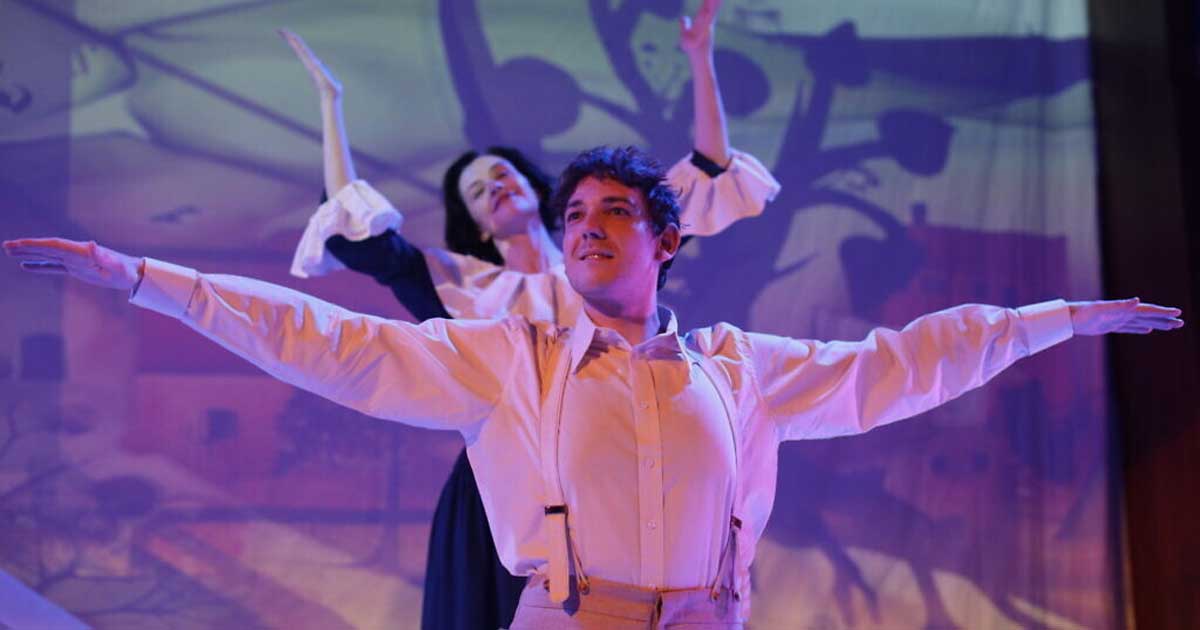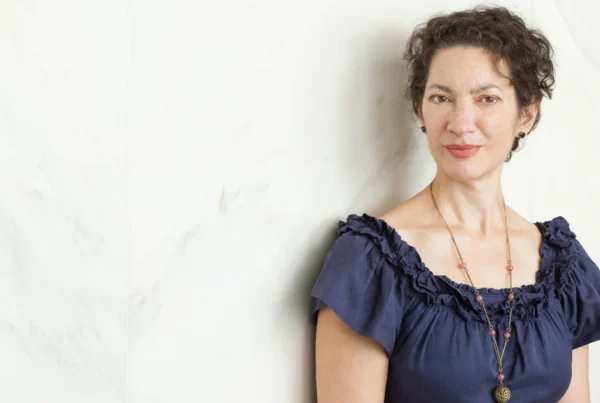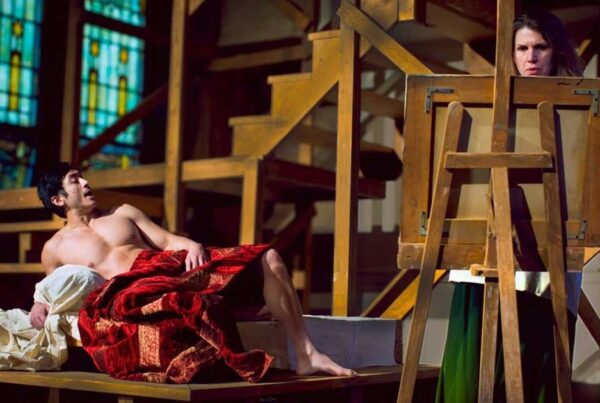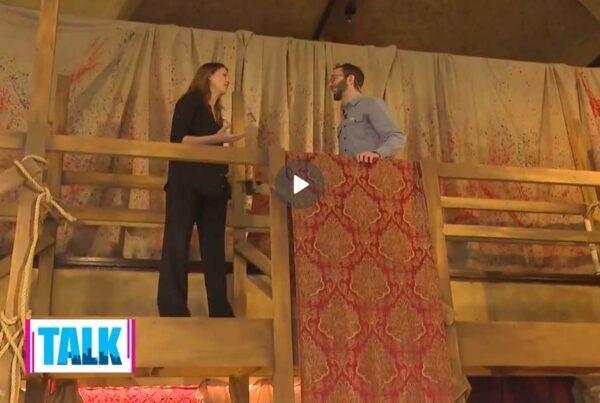
Pittsburgh Jewish Chronicle – Gustavo Zajac: “I want the audience when they leave the theater to feel like they visited a Chagall exhibition.”
Gustavo Zajac’s artistic origin story begins in Buenos Aires, Argentina, when, at the age of 9, he was introduced to Jewish folk dance.
Zajac began dancing in his school, which led to dancing in Jewish folk festivals, which, in turn, led to him becoming a Jewish folk dance teacher.
Some years later, Zajac would be on Broadway as an assistant choreographer for “Fiddler on the Roof” starring Alfred Molina and for the Tony-winning revival of “Nine” starring Antonio Banderas and Chita Rivera.
Now he’s in Pittsburgh, directing and choreographing “The Flying Lovers of Vitebsk,” a klezmer musical about artist Marc Chagall and his poet wife, Bella, produced by Quantum Theatre in conjunction with Violins of Hope Greater Pittsburgh. The show runs Oct. 26–Nov. 28 at Rodef Shalom Congregation.
“The Flying Lovers of Vitebsk” takes its name from the Lithuanian city where Chagall was born in 1887 and from his relationship with Bella, which is celebrated in so much of his work. While his art depicts Chagall and his wife whimsically floating above a Russian village or the Eiffel Tower, the actual backdrop of their lives included some of the most devastating years of Jewish history — including pogroms, the Russian Revolution and the Holocaust.
In many ways, it seems beshert that Zajac, who describes himself as “very, very Jewish,” is at the helm of the production.
He grew up in Buenos Aires, home to around 200,000 Jews, where he helped lead services at his Conservative congregation. He attended Jewish schools through high school and speaks fluent Hebrew.
In college, Zajac studied international relations and, in 1994, was the recipient of a Watson Fellowship to research Jewish communities in Europe.
Dance, though, continued to call to him, and when he finished his research in Europe, he turned to show business.
After studying musical theater in New York for a year, Zajac returned to South America and served as the resident director for Broadway shows running in Argentina, “looking after the shows for their entire run” after their directors left the country, he said.
“Every time I worked with these directors, they kept telling me, ‘You have the talent to be a director yourself,’” he recalled. “And then one day, I realized I was not going to be the greatest performer in the world, and that I could maybe one day be a great director. I thought I had some limitations as a performer. But I saw myself having no limitations as a director, so I wanted to go for excellence.”

Gustavo Zajac (Photo courtesy of Gustavo Zajac)
Zajac honed his skills by working with “many great international directors that visited Argentina,” he said. “I processed that information, and they became my biggest university. They later took me to Broadway from Argentina.”
Since then, Zajac has directed shows around the world, including in Japan and Korea.
And he is no stranger to Pittsburgh. For the last 20 years, he has spent several weeks each summer teaching at Point Park University’s International Summer Dance program.
Zajac’s enthusiasm for “The Flying Lovers of Vitebsk” is palpable.
“I have a connection to Chagall,” he said. “A deep connection.”
For one thing, the Jewish school he attended in Argentina was called Bami Marc Chagall. And as a teenage Jewish folk dancer, he performed a piece called “Chagall.”
“When I was like 13 or 14 years old, I was already dancing to Chagall’s paintings,” Zajac said.
What does it mean to dance to a painting?
“It means that you extract the core of what the painting is about, and then you reproduce it. choreographically. You can extrapolate from one art to the other. The whole show introduced dancing animals and flying people. And there was a wedding. So there were all the elements from a Chagall collection introduced in a dance show.”
That sensibility has stayed with him. When Zajac worked on the Broadway production of “Fiddler on the Roof,” he staged Tevye’s dream scene to evoke a Chagall painting.
“The Flying Lovers of Vitebsk” builds on that work.
“This is natural for me to work on [Chagall’s] art and work on his life because he is not a painter that’s foreign to me — he’s a painter that’s been with me for my entire life.”
“The Flying Lovers,” Zajac said, has three main thematic lines: the story of how Bella and Marc Chagall met and how their relationship developed; the fraught history of Europe from the late 19th century through World War II; and the art of Marc Chagall.
“I want the audience when they leave the theater to feel like they visited a Chagall exhibition without visiting an exhibition,” he said.
The approximately 90-minute show features two actors and three klezmer musicians who are directed by Pittsburgher Doug Levine. Zajac has added familiar Yiddish songs to the show that he hopes will resonate with the audience.
A violin that is part of the Violins of Hope collection will be used in the show. The instrument is more than 100 years old and arrived in the U.S. around 1931, brought by Harry Simon, who played for the Jewish community in New York.
“I mean, how many more elements can we have in this experience?” Zajac said. “I’m feeling like we’re about to do something very big. And I’m hoping that other theaters nationwide catch on the chance to reproduce the show and take it to their communities as well.”
Karla Boos, the founder and artistic director of Quantum Theatre, first saw “The Flying Lovers of Vitebsk” in 2017 in Edinburgh, Scotland, and knew then that she wanted to bring it to Pittsburgh. In a pandemic Zoom meeting with Zajac on another matter, she happened to mention the show.
“The connection of him to Chagall became clear,” Boos said, and everything fell into place.
“The creators allowed us to take it on — they made a version we could work with and they’re totally open to us doing what we think is best for the work,” she said. “They’re very moved by it being staged Rodef Shalom and as a part of Violins of Hope — that was super moving to them.”
The play, Boos said, originally was written as “more of just a straight love story, I think — a great international love story, with a background of the war and tragedy — but it was a personal work of two very young people (writer Jamieson and director Emma Rice) when it was created, who were themselves in love. So, they were happy to see that it has found a place in the world that is, I would say, bigger. And we’re just really proud to be bringing it to Pittsburgh.”




